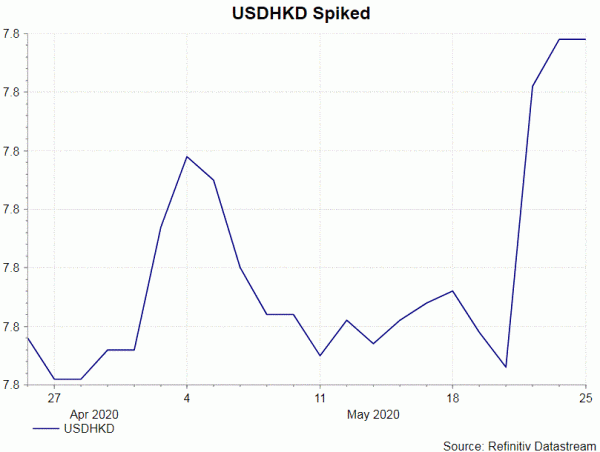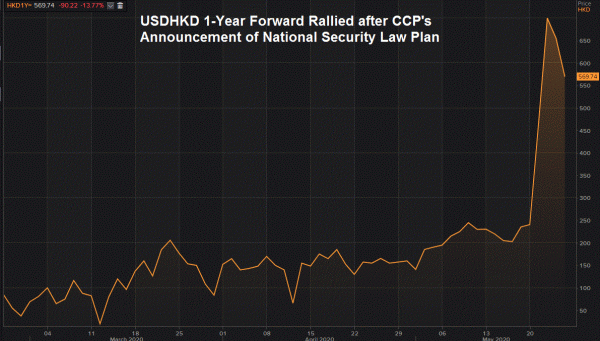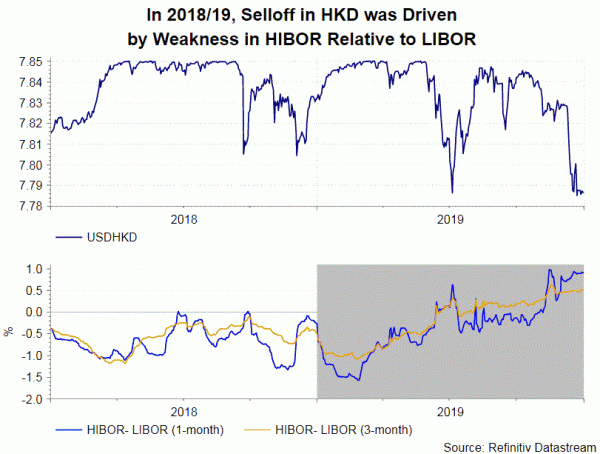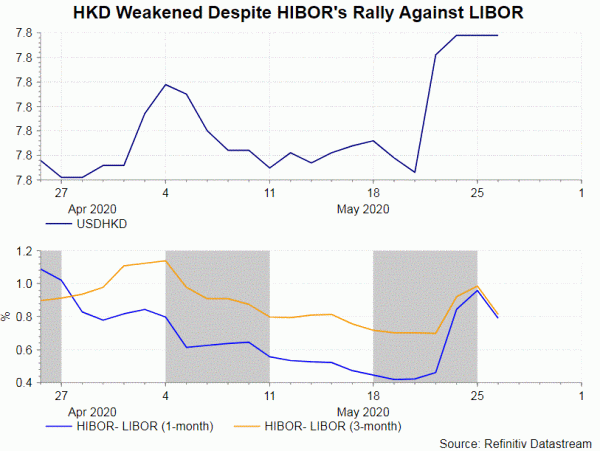Volatility in USDHKD has increased since last week. HKD fell from the strong-side convertibility undertakings against USD after the Chinese Communist Party (CCP) announced the plan to impose national security law in the city. The 12-month HKD FX swap points jumped from 240 to 700 in two days’ time. Although both HKD spot and forward recovered over the past two days, volatility likely remains. While the fundamental driver of the currency pair is US yield, political tensions, both in Hong Kong, and between China and the world, could have dramatic impact on the price movement.
US Yields as Fundamental Driver of HKD Movement
Under the linked exchange rate system, HKD is pegged to USD at a rate of 7.8. HKD is free to fluctuate within a range of 7.75 and 7.85. Hong Kong Monetary Authority (HKMA) is obliged to intervene should either of the boundary is breached. This arrangement suggests that the fundamental driver in USDHKD is US yields. Recall that in April 2018, HKD dived to the weakest level in 3 decades as HIBOR-LIBOR spread widened. Back then, the Fed was in its rate-hike cycle. Although HKMA had followed the Fed and increased its base rate, HIBOR (interbank reference rate in Hong Kong) stayed low due the ample liquidity in banks. Widening HIBOR-LIBOR spread led capital to flow out of Hong Kong to the US.
Weakness in HKD is different this time. The Fed has cut its policy rate to record low. Although Chair Jerome Powell has closed the door for negative interest rate, he has pledged to add more easing to stimulate the economy. Staying in the positive territory since November 2019, the HIBOR-LIBOR spread has widened sharply over the past few days. Theoretically, this should make HKD more attractive than USD.
Concerns over Loss of Hong Kong’s Special Status
Recent weakness in HKD is driven by political factors. At the “two sessions” last week, the Chinese Communist Party announced a plan to impose a new national security law in Hong Kong. The territory, while being part of China, has judicial, political and financial systems different from China. Bypassing Hong Kong’s legislature, a drafted resolution will be voted by the parliament in China and will likely be passed this week. The new legislation will further deprive Hong Kong people of freedom as the government can arrest and prosecute people it deems as committing act if secession, subversion, terrorism and conducting activities by foreign forces that interfere in Hong Kong. It is worrisome as China’s judicial system is notorious of arbitrary detention, unfair trial and torture. The law suggests that China could set up its own institutions in Hong Kong responsible for security. The legislation, if approved, will effectively call an end to “one country two systems” – the cornerstone of stability and prosperity in Hong Kong.
Global investors are obviously concerned about imposition of the law, as evidenced in the sharp fall in Hang Seng Index and weakness in HK dollar against US dollar. Their concerns are more related to tensions between China and the world, rather than protests in the city. Back in 2019, Trump linked the extradition bill to trade negotiations with China. The US Congress also overwhelmingly approved a law that could terminate its preferential trade access offered to the city, if it is no longer certified as enjoying autonomy. Trump’s administration last week condemned the intended move by China, threatening of sanctions if the new security law is imposed. Meanwhile, Chris Patten, the last governor of Hong Kong before the handover in 1997, condemned that “the Hong Kong people have been betrayed by China”. He added that and the west should stop kowtowing to Beijing for an illusory “great pot of gold”. In a joint statement led by him and former British Foreign Secretary Malcolm Rifkind, over 200 politicians across the world have decried China’s move, noting that the proposed legislation in Hong Kong is a “comprehensive assault on the city’s autonomy, rule of law and fundamental freedoms” and “flagrant breach” of the Sino-British Joint Declaration signed in the 80s.
Mass demonstration will be seen in Hong Kong in coming days in protest against the new law. Violence seems inevitable. Just like the anti-extradition bill movement in the second half of last year, these kinds of protests unlikely undermine Hong Kong’s status as the global financial centre. Indeed, credit ratings agencies suggested that protests reveal the respect of human rights and freedom in Hong Kong. What international investors are more concerned about is China’s destruction of the Basic Law and the Joint Declaration. The international community watch closely the developments. As the joint statement organized by Patten and Rifkind, “if the international community cannot trust Beijing to keep its word when it comes to Hong Kong, people will be reluctant to take its word on other matters”.




